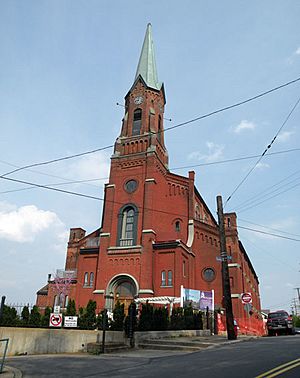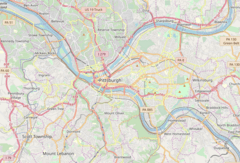- This page was last modified on 17 October 2025, at 10:18. Suggest an edit.
Saint Michael's Roman Catholic Church & Rectory facts for kids
 |
|
| Location | 21 Pius Street (South Side Slopes), Pittsburgh, Pennsylvania, USA |
|---|---|
| Coordinates | 40°25′29.77″N 79°59′3.7″W / 40.4249361°N 79.984361°W |
| Built/founded | 1861 (church), 1890 (rectory) |
| CPHD designated | February 23, 2001 |
| PHLF designated | 1970 |
Saint Michael's Roman Catholic Church & Rectory is a special building in Pittsburgh, Pennsylvania. It used to be a Catholic church and a rectory. A rectory is a house where a priest lives.
Today, this historic building is known as Angel's Arms Condominiums. It is located at 21 Pius Street in the South Side Slopes area of Pittsburgh.
About Saint Michael's Church
Saint Michael's Church is a very old and important building. It was built a long time ago, between 1855 and 1861. The church was designed in a style called Romanesque Revival. This style looks like old Roman buildings with round arches.
The person who designed the church was an architect named Charles Bartberger. He lived from 1824 to 1896.
The Rectory Building
Behind the church, there is another building called the rectory. This building was built later, in 1890. You can see a picture of it at this link.
The rectory was designed by a different architect, Frederick C. Sauer. He lived from 1860 to 1942. He designed the rectory in a style called Richardsonian Romanesque, which is similar to the church's style.
A Historic Landmark
Both the church and the rectory are considered very important. They were officially added to the List of City of Pittsburgh historic designations on February 23, 2001. This means they are protected because of their history and design.
The church itself was also added to the List of Pittsburgh History and Landmarks Foundation Historic Landmarks in 1970. This shows how special and valued these buildings are in Pittsburgh's history.

